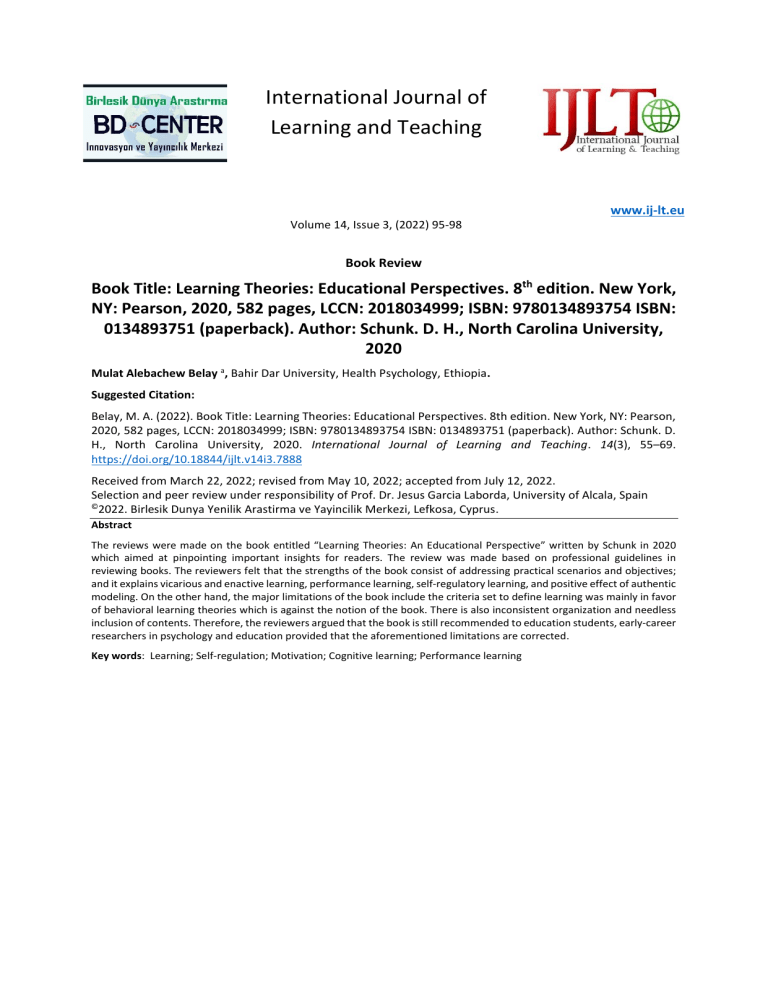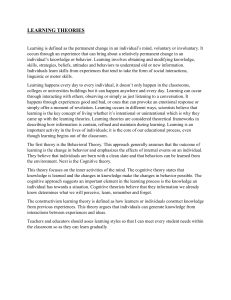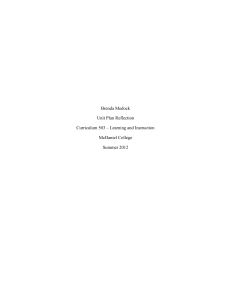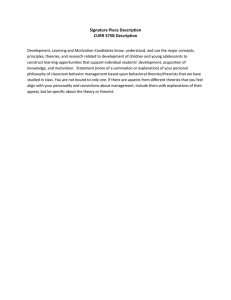
International Journal of Learning and Teaching www.ij-lt.eu Volume 14, Issue 3, (2022) 95-98 Book Review Book Title: Learning Theories: Educational Perspectives. 8th edition. New York, NY: Pearson, 2020, 582 pages, LCCN: 2018034999; ISBN: 9780134893754 ISBN: 0134893751 (paperback). Author: Schunk. D. H., North Carolina University, 2020 Mulat Alebachew Belay a, Bahir Dar University, Health Psychology, Ethiopia. Suggested Citation: Belay, M. A. (2022). Book Title: Learning Theories: Educational Perspectives. 8th edition. New York, NY: Pearson, 2020, 582 pages, LCCN: 2018034999; ISBN: 9780134893754 ISBN: 0134893751 (paperback). Author: Schunk. D. H., North Carolina University, 2020. International Journal of Learning and Teaching. 14(3), 55–69. https://doi.org/10.18844/ijlt.v14i3.7888 Received from March 22, 2022; revised from May 10, 2022; accepted from July 12, 2022. Selection and peer review under responsibility of Prof. Dr. Jesus Garcia Laborda, University of Alcala, Spain © 2022. Birlesik Dunya Yenilik Arastirma ve Yayincilik Merkezi, Lefkosa, Cyprus. Abstract The reviews were made on the book entitled “Learning Theories: An Educational Perspective” written by Schunk in 2020 which aimed at pinpointing important insights for readers. The review was made based on professional guidelines in reviewing books. The reviewers felt that the strengths of the book consist of addressing practical scenarios and objectives; and it explains vicarious and enactive learning, performance learning, self-regulatory learning, and positive effect of authentic modeling. On the other hand, the major limitations of the book include the criteria set to define learning was mainly in favor of behavioral learning theories which is against the notion of the book. There is also inconsistent organization and needless inclusion of contents. Therefore, the reviewers argued that the book is still recommended to education students, early-career researchers in psychology and education provided that the aforementioned limitations are corrected. Key words: Learning; Self-regulation; Motivation; Cognitive learning; Performance learning Belay, M. A. (2022). Book Title: Learning Theories: Educational Perspectives. 8th edition. New York, NY: Pearson, 2020, 582 pages, LCCN: 2018034999; ISBN: 9780134893754 ISBN: 0134893751 (paperback). Author: Schunk. D. H., North Carolina University, 2020. International Journal of Learning and Teaching. 14(3), 55–69. https://doi.org/10.18844/ijlt.v14i3.7888 Introduction The reviewers presented the book review result into two parts. Part one deals with the strengths and limitations of the book with brief discussions across related literature; and part two focuses on the conclusion and recommendations. 1. Overview of the Review 1.1. Strengths of Schunk’s Book - Learning Theories: An Educational Perspectives In the last decades, there has been new developments in views about human learning, development and thinking which continue to refine professionals understanding of these complex processes (Gredler, M., 2009). One of the most prominent book contributors for this field is Schunk, D.H.(2020). The book is a guide to fruitful work in psychology for all the students, teachers and researchers. It has been aimed to supplement professionals all the way in conceptualizing learning as well as developing, conducting and reporting educational researches. The author prepared an enlighten text for educators, researchers and students focusing the theoretical principles, concepts, and research findings and providing applications of principles and concepts in the area of education institutions. The author has used three major settings throughout the book to demonstrate applications of principles of learning, motivation, and self-regulation. The book was organized comprehensively which the users better understand subsequent links made between brain functions and cognition as well as constructive learning principles. In addition, the author addressed the issues of behaviorism and the current issues like information processing theory, constructivism and cognitive learning processes. Schunk has integrated the issue of motivation, self-regulation and development which are relevant to understand and conceptualize learning theories and its application in all Ethiopian education institutions. The reviewers felt that Schunk’s book is quiet advanced in clarifying learning theories. Thus, Schunk’s book is most important book that could enable educators, researchers and students to realize and apply the learning theories in Ethiopian context in all levels of education as well as related disciplines. The reviewers concluded that Schunk’s book could be a learning resource for the courses such as students learning and motivation, educational psychology, human development and instructional design in Ethiopian higher education institutions and education colleges. As critical issues for learning, the author has carefully identified the issues that have huge impact on readers to concentrate the intent of the book thoroughly and he has made a balance views about behavioral and cognitive learning theories. The reviewers have positively confirmed about Schunk’s remarkably important statements in his second chapter that acquaints about where and how learning occurs in human brain. The author’s statements also inspire educators and researchers to further understand and realize the effect of brain functioning on the effectiveness of learning. Schunk has explained this century’s contents that most readers, educators and researchers want to know about vicarious and enactive learning, performance learning, self-regulatory learning, and positive effect of authentic modeling to build positively sculpted generation. 1.2. Limitations of Schunk’s Book - Learning Theories: An Educational Perspectives The reviewers found some limitations of the book that the author set criteria to define learning as “learning involves change; learning endures overtime; and learning occurs through experience.” Hence, the reviewers strongly believed that the criterion seems excursively in favor of behavioral learning theories which might polarize readers, educators and researchers to one spectrum of source of knowledge of course in the preface section, Schunk stated that the main intention of the book is to address the origin of contemporary learning theories, beginning with philosophical positions, origin of knowledge and its relations to environment and relevance to learning in educational setting. However, the author didn’t support the premises in that it lacks connecting the past psychological study of learning with contemporary philosophical and psychological conceptualization of learning. For example, Schunk raised the issue of learning theory and research. The book was supposed to 96 Belay, M. A. (2022). Book Title: Learning Theories: Educational Perspectives. 8th edition. New York, NY: Pearson, 2020, 582 pages, LCCN: 2018034999; ISBN: 9780134893754 ISBN: 0134893751 (paperback). Author: Schunk. D. H., North Carolina University, 2020. International Journal of Learning and Teaching. 14(3), 55–69. https://doi.org/10.18844/ijlt.v14i3.7888 encompass the past and present connection between research and theory, yet author didn’t address how research findings supported learning theories in understanding and realizing learning as wells formulating new concepts in the learning contexts and how learning theories could be used as framework to conduct a study. Similarly, the reviewers believed Schunk didn’t concretely address how the assessment could be applied in cognitive based classrooms. The author mentioned as “…ways to assess the products of learning or outcomes of learning” but this didn’t support the thesis of the book as it claimed in the introduction section, “…..the text focuses on cognitive learning theories and educational implications.” Schunk has given more emphasis on the role of information processing in cognitive learning theories that seemed he has limited to attending stimuli, rehearsing, encoding, transforming, storing and retrieving information but cognitive learning theories in the past and today includes reasoning, critical thinking, discovery learning (Bicknell-Holmes & Hoffman, 2000,Tolman, 1886-1959 and Chi,Glaser, & Parr, 1991). Similarly, the author seemed to lack in clarifying the conceptual roles of memory in cognitive learning theories as stated below: Cognitive theories assign a prominent role to memory. Information processing theories equate learning with encoding, or storing knowledge in memory in an organized, meaningful fashion. Information is retrieved from memory in response to relevant cues that activate the appropriate memory structures. The role of memory in cognitive learning theories extends to analysis, synthesis, discovery, creativity, critical thinking and transfer of learning which are discussed in cognitive learning process as part of information processing theory. In contrast to many educational psychology authors, Schunk has hosted cognitive learning process in a new chapter. Thus, the reviewers felt that this approach might confuse educator, researchers and readers in some areas including meta-cognition, expertisenovice learning, problem solving, and transfer of learning which all are related to Vygotsky’s concepts of constructivism. Schunk also didn’t address the issue of how and why cognitive learning processes are organized and presented for readers regardless of social cognitive learning process, behavioral learning and information processes. Hence, this might confuse novice readers from different educational background that they might perceive cognitive learning process is much favored area for better understandable for educators, researchers and students learning. The reviewers believed that the author seemed to needlessly cover some of the issues of physiological aspects of the brain. For instance, “…..brain and spinal cord consist of 100 billion of cells…” but the reviewers wish that instead, the Schunk might need to provide evidences how brain affects learning and how learning affects brain functioning. Moreover, the reviewers claimed that the author has missed presenting the learning theories in chronological order or sequences. This is because most authors of educational psychology text books begin with classical conditioning followed by connectionism, Operant conditioning and Contiguity which all are organized chronologically (Slavin, 2006, Plotnik & Kouyoumdjian, 2011, and Santrock,2012, etc…). However, Schunk has begun with behavioral learning theories of Thorndike’s connectionism which seemed without justification. As suggested by many scholars, theories need to be presented beginning from its basic assumptions and principles. Of course, the author has mentioned some basic assumptions for social learning theory, information processing theory and constructivism theories but the reviewers found that behavioral learning theories are introduced directly in specific ideas. Similarly, Schunk has stated specific basic assumptions of operant conditioning but the reviewers feel that some contents appear repeatedly many times with no basic conceptual difference. For example, motivation and emotion appears repeatedly in different sections of the book. 2.1. Conclusion 97 Belay, M. A. (2022). Book Title: Learning Theories: Educational Perspectives. 8th edition. New York, NY: Pearson, 2020, 582 pages, LCCN: 2018034999; ISBN: 9780134893754 ISBN: 0134893751 (paperback). Author: Schunk. D. H., North Carolina University, 2020. International Journal of Learning and Teaching. 14(3), 55–69. https://doi.org/10.18844/ijlt.v14i3.7888 Learning and teaching are two most useful experiences of human being, many scholars have tried long to explain the phenomena during which we ‘learn’ and ‘teach’. Schunk’s book might have a great contribution to its field in that it gives the basics in context with typical processes of learning and teaching. The book could a hand guide material for educators, researchers and students for all levels of education institutions and for all professionals who might be interested to understand nature of learning and its applications. 2.2. Recommendations The reviewers recommended that the author might reconsider in: • • • • • Coherent incorporation of some contents Avoid needless repetition of contents Focusing on some selected important contents Consistent organization of contents and supplementing by additional reflective activities as well as case studies in educational practices. If possible, integrating educational practices with learning theory, domains of learning objectives, designing curriculum as well as planning learning activities which all would make the book more comprehensive. • References Bicknell-Holmes, T., & Hoffman, P. S.(2000). Elicit, engage, experience, explore: Discovery learning in library instruction. Reference Services Review, 28(4), 313-322. : Chi, M. T. H., Glaser, R., & Farr, M. (1991). The Nature of expertise. Hillsdale, NJ: Erlbaum. Gredler, M. (2009). Learning and instruction: Theory into practice (6th ed.). New Jersey: Columbus. Plotnik. R., & Kouyoumdjian, H. (2011). Introduction to Psychology (9th ed.). USA Santrock, J.W. (2012). Educational psychology (8th edition). McGraw-Hill. Schunk, D.H.(2020). Learning theories: An Educational perspective. (8th ed.). NewYork. Slavin, R. E. (2006). Educational psychology: Theory and practice (8th ed.). USA. 98




